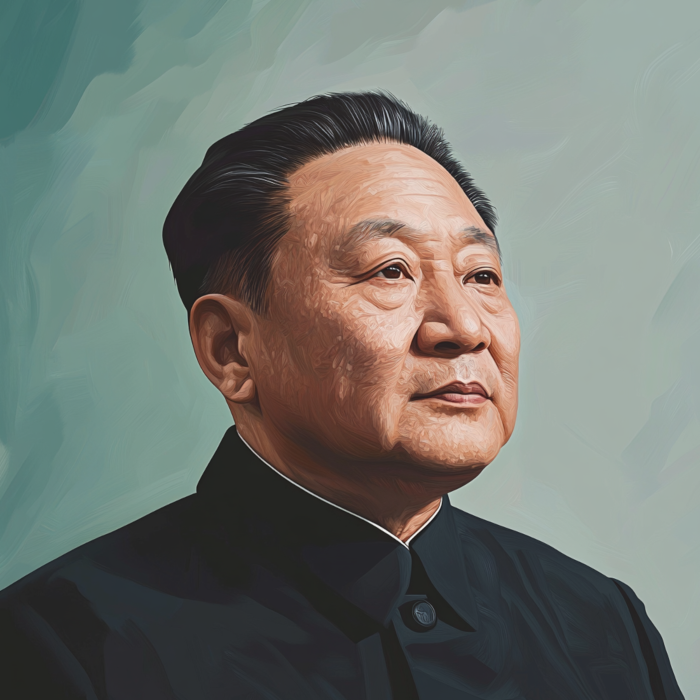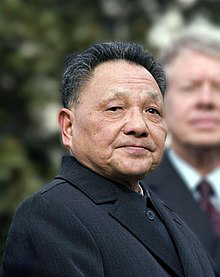
Deng Xiaoping (1904-1997) was a Chinese revolutionary leader and statesman who played a key role in transforming China into one of the world’s largest economic powers. Often regarded as the "Architect of Modern China," Deng led the country through a period of significant economic reform and modernization during the late 20th century. Here is an overview of his life and contributions:
Early Life and Rise in the Communist Party
- Birth and Education: Deng was born on August 22, 1904, in Guang'an, Sichuan Province. In his youth, he went to France as part of a work-study program, where he became exposed to Marxist ideas and joined the Chinese Communist Youth League.
- Joining the Communist Movement: While in France and later in the Soviet Union, Deng became an active member of the Chinese Communist Party (CCP). He returned to China in the 1920s, becoming a key figure in the revolutionary movement against the Nationalist government (Kuomintang).
- The Long March: Deng participated in the Long March (1934-1935), a strategic retreat led by the CCP that became a defining event for the party’s leadership. Deng gradually rose through the ranks to become a senior leader, especially during and after the Chinese Civil War.
Political Career and Mao Era
- Role under Mao Zedong: After the establishment of the People’s Republic of China in 1949, Deng Xiaoping held a series of high-ranking positions within the Communist Party. He was known for his administrative efficiency and loyalty to Mao Zedong during the early years of the People's Republic.
- Purge during the Cultural Revolution: Deng faced political setbacks during the Cultural Revolution (1966-1976). He was labeled a "capitalist roader" by radical factions within the party led by Mao and was purged from his leadership roles, enduring house arrest and exile. However, after Mao’s death in 1976, Deng returned to power.
Reform and Opening-Up (1978-1992)
Economic Reforms: Deng Xiaoping became the paramount leader of China by 1978, initiating sweeping economic reforms that shifted China away from the rigid Maoist policies. Deng’s slogan "Reform and Opening Up" led to the transition from a planned economy to a mixed socialist market economy.
- Special Economic Zones (SEZs): One of Deng’s major initiatives was the establishment of Special Economic Zones in coastal cities such as Shenzhen, Zhuhai, and Xiamen. These zones encouraged foreign investment and allowed China to experiment with market-oriented economic policies.
- Decollectivization: Deng moved away from collectivized farming, allowing farmers to lease land under the "Household Responsibility System." This significantly increased agricultural productivity and improved rural incomes.
- Four Modernizations: Deng’s policies focused on the Four Modernizations—agriculture, industry, defense, and science & technology—which formed the core of his economic strategy to modernize China and strengthen its position on the global stage.
"Socialism with Chinese Characteristics": Deng was instrumental in redefining socialism in a way that fit China’s unique conditions. He famously stated, "It doesn’t matter whether a cat is black or white, as long as it catches mice," illustrating his pragmatic approach to economic policy. Deng's emphasis was on achieving tangible results over adhering strictly to ideological dogma.
Key Achievements and Challenges
- Economic Boom: Under Deng’s leadership, China experienced rapid economic growth, and the country began its transformation into a global manufacturing hub. Millions of Chinese were lifted out of poverty, and living standards improved significantly.
- Opening to the West: Deng also sought to reestablish diplomatic and economic relationships with Western nations, fostering international trade and collaboration. In 1979, he visited the United States, marking the beginning of improved Sino-American relations.
- Political Challenges: While Deng was open to economic reforms, he maintained strict control over political power, emphasizing the importance of CCP leadership. This approach was evident in his handling of the 1989 Tiananmen Square protests, where peaceful demonstrations for political reform and greater democracy were violently suppressed. The incident left a lasting impact on China’s political landscape and on Deng’s legacy.
Legacy and Death
- Economic Transformation: Deng Xiaoping is remembered as the visionary leader who set China on its path to modernization. His policies helped transform China into a global economic powerhouse with a substantial middle class, though they also led to increased inequality between urban and rural areas.
- Pragmatism: Deng is celebrated for his pragmatic approach, often described as "crossing the river by feeling the stones"—an expression that captured his gradual and experimental style of policy implementation.
- Death: Deng Xiaoping died on February 19, 1997, leaving behind a mixed legacy of economic success and political authoritarianism. His death came just months before the historic return of Hong Kong from British to Chinese sovereignty, a moment influenced by his negotiation efforts during the 1980s.
Deng's Influence on Modern China
- Reform Era Leadership: Many of the reforms Deng initiated laid the groundwork for China’s current economic system. His influence can be seen in the policies of his successors, including Jiang Zemin, Hu Jintao, and even Xi Jinping, who have all pursued paths of economic development inspired by Deng’s original vision.
- Continuing Stability and Growth: Despite his strict approach to political dissent, Deng’s policies fundamentally altered China’s place in the world, making it a leading economic power. His model of economic liberalization without political reform has shaped China’s political and economic framework well into the 21st century.
Deng Xiaoping remains a pivotal figure in Chinese history for his role in transforming the country’s economy while retaining the CCP’s hold on power. His contributions have been both celebrated for lifting millions out of poverty and criticized for limiting political freedoms, making his legacy a complex but crucial chapter in modern Chinese history.



